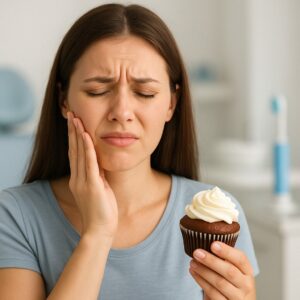What Does a Cavity Feel Like?

Insights from Your Trusted Cosmetic Dentist in Daphne, AL
Cavities are one of the most common dental problems that people experience—second only to the common cold! But if you’ve never had a cavity before, you might be wondering: What does a cavity actually feel like? The answer depends on the severity of the decay and how your teeth respond to different foods—especially sweet or acidic ones.
How Cavities Form
Your mouth naturally contains both good and harmful bacteria. When you consume sugary snacks like candy, pastries, soda, or even starchy foods like chips, the bad bacteria feed on those sugars. In turn, they produce acids that attack your enamel—the hard outer layer of your teeth.
When this acid isn’t removed quickly through brushing and flossing, it begins to eat away at the enamel. Over time, this leads to the development of a cavity. In its earliest stages, tooth decay can often be reversed by using fluoride toothpaste and improving your oral hygiene habits. However, once the enamel is compromised and decay spreads to the inner layers, treatment becomes necessary.
Early Signs and Symptoms of a Cavity
In the beginning, you may not feel anything at all. That’s because tooth enamel doesn’t have nerves. But as decay reaches deeper into the tooth and irritates the dentin or nerves, symptoms become more noticeable. Here’s what to watch for:
-
Mild to sharp pain when eating or drinking (especially hot, cold, or sweet items)
-
Sensitivity that lingers even after the stimulus is gone
-
Pain when chewing or biting down
-
Visible pits or holes in the teeth
-
Dark spots or discoloration (white, brown, or black)
-
Toothache that comes and goes
If you’re experiencing any of these symptoms, it’s a good idea to schedule a dental visit before the problem worsens.
Why Do Cavities Hurt More with Sweets?
Many people notice that sweets cause a sudden, sharp pain in a decayed tooth. That’s because sugary foods tend to stick to your teeth, especially around damaged or weak areas. When sugar comes into contact with the cavity, it fuels bacteria and acid production—further irritating the exposed dentin or nerves. Even without a visible cavity, people with sensitive teeth may feel discomfort when eating sugary treats.
Preventing Cavities Before They Start
The best way to prevent cavities is through a consistent and effective oral hygiene routine:
-
Brush your teeth twice daily with fluoride toothpaste
-
Floss once a day to remove food particles and plaque between teeth
-
Drink plenty of water (especially fluoridated water)
-
Limit sugary snacks and acidic drinks
-
Visit your dentist regularly for professional cleanings and exams
At Sweet Water Dentistry, we’re proud to serve the Daphne, AL community with compassionate care and cosmetic dental solutions that keep your smile healthy and beautiful. Whether you’re dealing with tooth sensitivity, looking for cavity treatment, or simply want to brighten your smile, we’re here to help.
Call us today to schedule your appointment and take the first step toward a healthier smile!
📞 251-210-2773 | Cosmetic Dentist AL Daphne
Visit us for expert care:
Sweet Water Dentistry
📍 5915 Sweetwater Cir, Fairhope, AL 36532
🌐 sweetwatersmile.com
📞 Call or Text: (251) 210-2773
Follow us on Facebook and Instagram for the latest updates and special offers!
Down by the Bay

